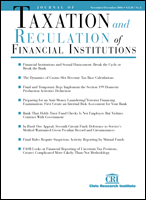Complete Issue
Author: Houman B. Shadab.
Source: Volume 25, Number 04, March/April 2012 , pp.1-60(60)

< previous article |return to table of contents
Abstract:
Bank capital requirements are among the most challenging and important sets of rules in the financial system and are currently the target of ongoing regulatory reform worldwide. Our first article, by Kathleen Scott, explains the nature of risk-based capital and traces the history of international capital regulation from its origins in 1988. Ms. Scott focuses on the new Basel III requirements promulgated in the wake of the financial crisis, including requirements relating to leverage and liquidity, and also on new requirements for U.S. banks that are still being implemented under the Dodd-Frank Act of 2010. In addition to being subject to capital regulation, U.S. banks operating outside the U.S. are subject to a regime of tax law that prohibits evasion by means of using off-shore accounts. In this issue’s second article, former federal prosecutor Ian Comisky and former U.S. Department of Justice trial attorney Matthew Lee review the required records doctrine as it applies to foreign bank accounts. The authors note that a traditional protection afforded by the Fifth Amendment privilege against self-incrimination may be jeopardized, as it applies to foreign bank account records, by a recent federal court of appeals decision, and that the U.S. Supreme Court may ultimately have to decide what may become a widening split among federal courts. In our third article, Donna Wilson, John McGuinness, and Christina Weis turn to recent amendments under the Fair Credit Reporting Act (FCRA) of 1971. In particular, the authors focus on litigation and state preemption issues arising from amendments to FCRA by the Consumer Credit Reporting Reform Act of 1996 and the Fair and Accurate Credit Transactions Act of 2003. As the authors explain, there are significant differences in the way federal courts approach actions arising under FCRA and its amendments. Exchange traded products are a growing and somewhat controversial brand of actively managed investment vehicles. In our fourth article, Jon Harz provides an overview of exchange traded funds and exchange traded notes. Mr. Harz covers their regulatory and tax treatments, and the concerns regulators have regarding investor misperceptions about how the products perform. This issue ends with two columns. In the first, State & Local, Roy Crawford and Roburt Waldow review recent changes to the California Revenue and Taxation Code relating to rules for apportionment of income of banks and their affiliates. In the second, Regulation, Michael Krajcer explains a recent ruling favorable to financial institutions in claiming a tax credit for developing internal-use software.Keywords: capital standards; foreign bank account records; Fair Credit Reporting Act (FCRA); Fair and Accurate Credit Transactions Act of 2003 (FACTA); Exchange traded products; California apportionment rules; research tax credits
Affiliations:
1: Journal Editor, New York Law School.